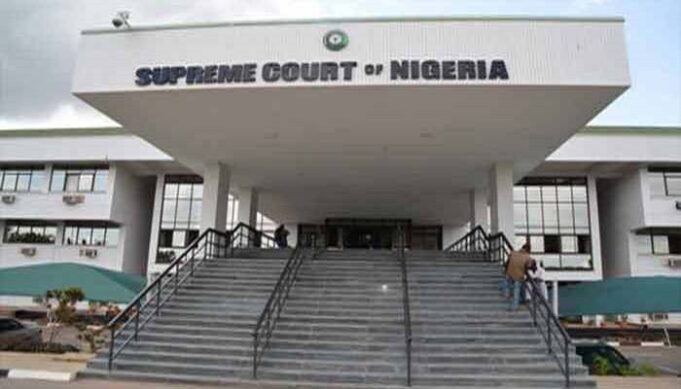The Supreme Court, on Friday, struck out the suit voiding the provisions of Section 84 (12) of the Electoral Act 2022.
The suit was filed by President Muhammadu Buhari and the Attorney-General of the Federation, Abubakar Malami.
Buhari and Malami filed the suit on April 29 before the Supreme Court through a group of private lawyers, including Lateef Fagbemi (SAN), hired by the Office of the Attorney-General of the Federation.
The National Assembly was listed as the sole defendant in the suit.
The plaintiffs contended among others, that the said section of the Electoral Act 2022 was in conflict with constitutional provisions.
They contended that section 84(12) of the Electoral (Amendment) Act, 2022 was inconsistent with the provisions of sections 42, 65, 66, 106, 107, 131, 137, 147, 151, 177, 182, 192, and 196 of the constitution as well Article 2 of the African Charter on Human and Peoples Rights.
However, the apex court, in a unanimous decision by a seven-man panel of the Justices led by Justice Muhammad Dattijo, on Friday, held that it lacked the jurisdiction to entertain the suit, saying it amounted to an abuse of the judicial process.
The court held that Buhari was not a proper person to approach it with such suit, owing to the nature of reliefs that were sought.
Justice Aokmaye Agim, who delivered the lead judgement, held that President Buhari, having earlier assented to section 84 (12) of the Electoral Act 2022, cannot turn around to approach the court to strike it down.
“There is no provision in the constitution that vests the president the power to challenge the constitutionality or desirability of legislation after he has assented or denied his assent. In this case, the president gave his assent,” Justice Agim ruled.
He added that the request by Buhari to the National Assembly to delete the provision amounted to constitutional violation.
He said: “The President has no power to request or compel the national assembly to amend any part of the Act of the National Assembly in which he has participated in its making.
READ ALSO: Electoral Act: Reps move to override Buhari’s veto over statutory delegates
”This suit cannot be entertained by this court under Section 1(1) (a) of the Additional Jurisdiction of the Supreme Court Act.”
Other members of the panel consented to the lead judgement. They are Dattijo-Muhammad, John Okoro, Amina Augie, Lawal Garba and Ibrahim Saulawa.
It would be recalled that both chambers of the National Assembly, in March 2022, rejected President Buhari’s request to amend the clause in the Electoral Act.
Subsequently, the Attorney-General vowed that the Federal Government would consider all other options available before taking a position on the matter.
In the suit marked SC/CV/504/2022, Buhari and Malami sought an order of the court to strike out the section of the Act, which they said was inconsistent with the nation’s constitution.
The National Assembly, however, asked the Supreme Court of Nigeria to strike out the suit instituted by Buhari and Malami (SAN) over Section 84 (12) of the Electoral (Amendment) Act, 2022.
President Buhari, on February 25 signed the electoral bill into law with a requirement that the section should be deleted in order to deepen democracy in the country.
But the National Assembly in March threw out the President’s request and insisted that serving political appointees must resign before contesting elections.
Malami, who also opposed the lawmakers’ decision, vowed that the Federal Government would explore other means, including the court to ensure the provision that he claimed offended other sections of the constitution, was expunged from the amended Act.
- Tinubu: I removed fuel subsidy to stop Nigeria from bankrupt - April 28, 2024
- Tinubu to Samsung: Nigeria, best place for tech investment - April 28, 2024
- Nigeria secures $600m investment with Danish shipping coy Maersk - April 28, 2024










